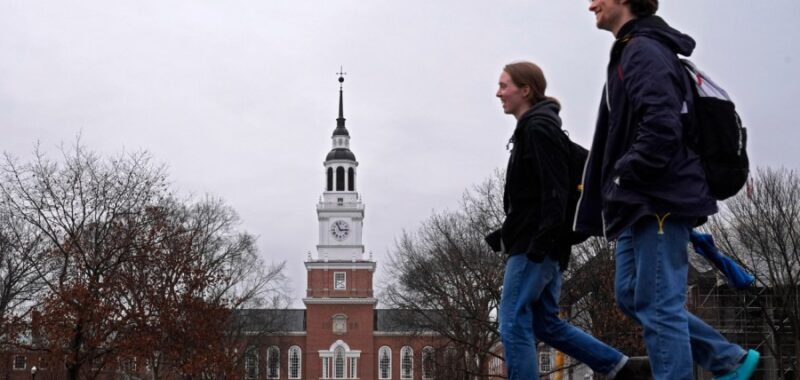
There was a time when the American Association of University Professors (AAUP) deserved its self-description as the “most prominent guardian of academic freedom” for faculty and students in the U.S., but not any longer.
Last month, the organization rescinded its long-standing opposition to academic boycotts, which it had previously recognized as aiming “directly at the free exchange of ideas,” in favor of a new policy declaring that such boycotts “can legitimately seek to protect and advance . . . academic freedom and fundamental rights.”
The turnaround is a betrayal of academic values, which ideally comprise the “freedom of teachers and researchers to engage in work with academic colleagues” and “the freest possible international movement of scholars and ideas,” without political restraints.
The very purpose of an academic boycott, however, is to impose limitations on scholarly exchanges by placing certain institutions or faculty off limits.
Although the revised AAUP statement does not mention Israel or Palestine, it is obvious that it came about in the context of the siege of Gaza and the intensified efforts of the boycott, divest, sanctions (BDS) movement against Israel.
The AAUP leadership has admitted as much, saying that “Academic boycotts, it seems, cannot be thought about apart from the polarizing geopolitics of Palestine and Israel.”
But the facilitation of a political campaign, whatever its merits, cannot justify retreating from academic principles.
Defenders of the AAUP’s position claim that a boycott can actually “protect and advance” academic freedom by targeting only those nations or institutions “that themselves violate academic freedom or the fundamental rights upon which academic freedom depends.”
The consequence of a truly effective boycott, however, would inexorably limit academic freedom in those circumstances, rather than enhance it, by choking off what might be the faculty’s most meaningful contact with the outside scholarly world.
In the words of a former chair of the AAUP Committee on Academic Freedom, “The whole idea of boycotting academic institutions in order to defend academic freedom is utterly wrongheaded.”
Equally wrongheaded is the argument that boycotts can be aimed exclusively at institutions rather than “individual scholars and teachers.” This is incoherent even in theory, given that the lives and careers of students and teachers are necessarily intertwined with their universities.
The boycott of an institution — including, say, the refusal to participate in conferences, review tenure files or transfer credits — will inevitably take a toll on students and faculty.
The distinction has already proven impossible in practice.
A University of Michigan professor, for example, refused to write a reference for a student’s participation in a university-sponsored program in Israel. He explained that his adherence to the “academic boycott against Israel” precludes “writing letters of recommendation for students planning to study there,” although he would gladly provide a reference for any other country.
The editors of a scholarly journal at the University of Minnesota refused to consider a submission from an Israeli Ph.D. “due to the journal’s commitment to BDS guidelines” and the author’s “affiliation with Israeli academic institutions.”
In fact, the author’s affiliation was with a German University, which led to a cryptic apology from the journal, though the harm had already been done. In an email exchange, the editors declined to tell me how or whether they would apply BDS guidelines in the future.
Even worse is likely to come. In Europe, Israeli authors’ articles are summarily “rejected by journals” and “reviewers refuse to review Israeli research projects or academic papers.” Some universities have imposed “bans on inviting Israelis to academic conferences.”
Then there is the platitude that “individual faculty members and students should be free to weigh, assess and debate the specific circumstances giving rise to calls for systematic academic boycotts.” Thus, as the AAUP president put it, there is a “collective and individual [right] of faculty members to decide democratically to support a systematic academic boycott.”
The AAUP’s original opposition, however, addressed only the wisdom and intellectual validity of boycotting, not the right of individuals to engage in it.
Faculty members, like all citizens, have many rights of speech and association that can be harmful when exercised. They can belong to discriminatory private clubs, oppose equitable admissions policies, advocate censorship, or perhaps deny the Holocaust (if kept out of their teaching).
But the AAUP would never declare such activity “legitimate,” even though protected by the First Amendment.
As the Foundation for Individual Rights and Expression put it, there is no contradiction between recognizing “the rights of individual students and faculty” and opposing “academic boycotts as a threat to academic freedom.”
The tragic irony of the new AAUP position is that it will surely be used to promote the boycott of Israeli universities, which happen to be the most liberal, peace-oriented, and integrated institutions in the country.
Jewish and Arab students at Tel Aviv University, for example, have annually observed Nakba Day, commemorating the dispossession and exile of Palestinians that occurred during Israel’s war of independence.
Prime Minister Benjamin Netanyahu and his settler allies are no friends of higher education, which they accurately see as a locus of resistance to their oppressive government. Nor would they care if Israeli scholars are isolated from their international colleagues.
By weakening Israeli universities, the academic boycotters are undermining the cease-fire movement and strengthening the eliminationists.
As the Polish psychology professor Michał Bilewicz wrote in the Chronicle of Higher Education, “Academic boycotts hurt dissidents most.”
And now, they have the blessing of the AAUP.
Steven Lubet is the Williams Memorial Professor Emeritus at the Northwestern University Pritzker School of Law.

